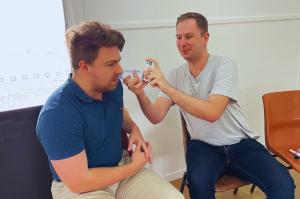Tough Winter Incoming: Increase in Asthma Attacks Expected due to COVID and Flu
Health experts warn of heightened asthma risk this winter due to COVID-19 and Influenza, underscoring the critical need for asthma first aid training.
BRISBANE, QUEENSLAND, AUSTRALIA, June 16, 2023/EINPresswire.com/ -- As we brace for a potentially challenging winter season, health experts across Australia are voicing concern about the increased risk of asthma attacks, compounded by the effects of COVID-19 and Influenza. With 11% of Australians diagnosed with asthma, as reported by the Australian Institute of Health and Welfare (https://www.aihw.gov.au/reports/chronic-respiratory-conditions/chronic-respiratory-conditions/contents/asthma), the need for widespread understanding and preparedness is more critical than ever.
"First aid training plays a vital role in managing asthma emergencies, and this knowledge will be crucial in the coming months," advises Mal Thompson, Managing Director of Brisbane-based provider, My First Aid Course. "Asthma, already prevalent in Australia, could be further exacerbated by the added complications of COVID and the flu. Therefore, being prepared with basic asthma first aid is a priority."
Historically, hospitalisations due to asthma peak in late winter, with a total of 25,000 admissions recorded in 2021-22 (https://www.aihw.gov.au/reports/chronic-respiratory-conditions/chronic-respiratory-conditions/contents/asthma). This pattern, combined with potential strains on the healthcare system due to COVID-19 and Influenza, is raising serious concerns.
In response, experts advocate for widespread public awareness of asthma first aid, including recognising the signs of an asthma attack and knowing how to provide immediate help.
Common asthma symptoms include wheezing, breathlessness, a feeling of tightness in the chest, and persistent coughing.
"Asthma first aid is relatively simple, even for someone with no medical background," Thompson shares. "With a standard asthma puffer and spacer, the basic process consists of four steps: firstly, sit the person upright and reassure them, don't leave them alone.
Secondly, give four puffs of a reliever medication through a spacer device. Thirdly, wait four minutes, and if there's no improvement, give another four puffs. Finally, if there's still no improvement, call emergency services."
Accessible asthma medications, available over the counter, and the presence of these medications in home and workplace first aid kits, are crucial parts of preparedness.
Beyond personal preparedness, the call to action for the public is to actively seek first aid training that includes the management of asthma emergencies. My First Aid Course offers the HLTAID011 Provide First Aid course, incorporating theory and practical elements specifically targeted to handle asthma in various settings.
"Our first aid courses have adapted to meet current needs, with a significant portion of the theory now learned online," explains Thompson. "This allows participants to attend a short, focused practical session to complete the course."
By equipping themselves with these vital skills, Australians can contribute to a safer community environment this winter and potentially save a life.
For more information about first aid training and the courses available, visit the My First Aid Course website.
General Manager
My First Aid Course Pty Ltd
738726777398
email us here
Visit us on social media:
Facebook
Instagram
Legal Disclaimer:
EIN Presswire provides this news content "as is" without warranty of any kind. We do not accept any responsibility or liability for the accuracy, content, images, videos, licenses, completeness, legality, or reliability of the information contained in this article. If you have any complaints or copyright issues related to this article, kindly contact the author above.


